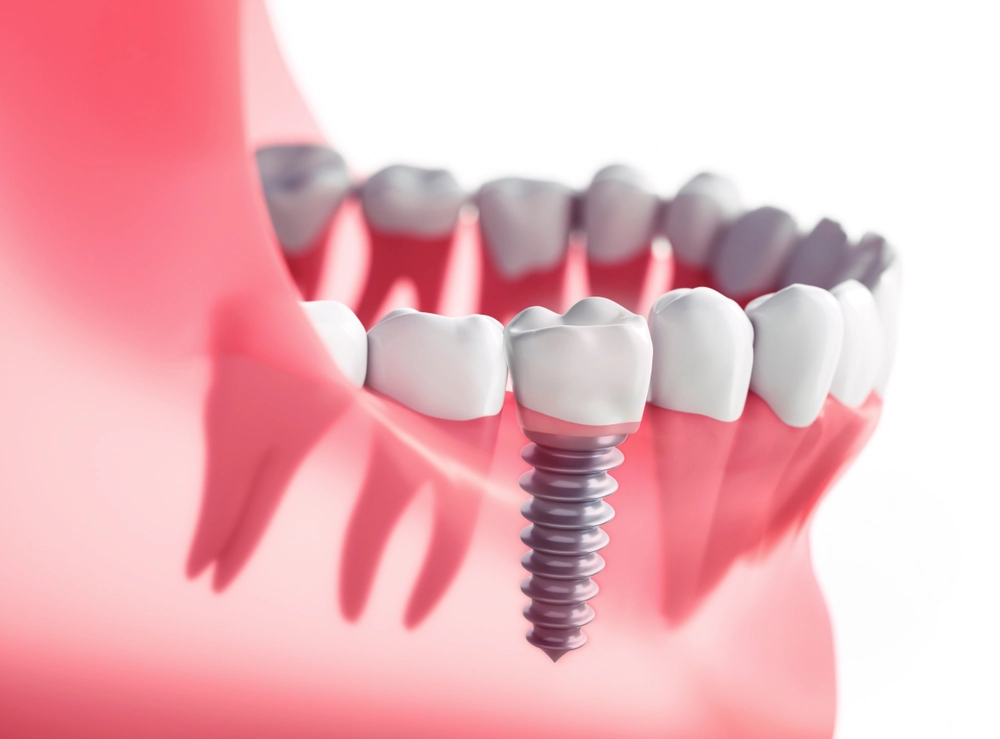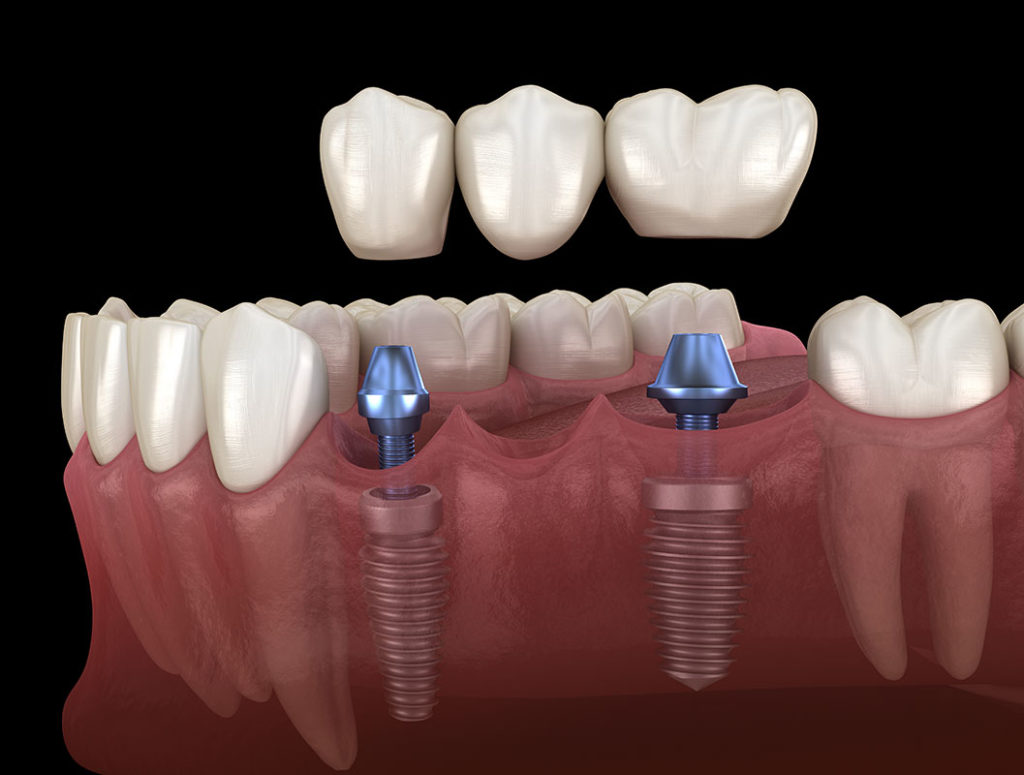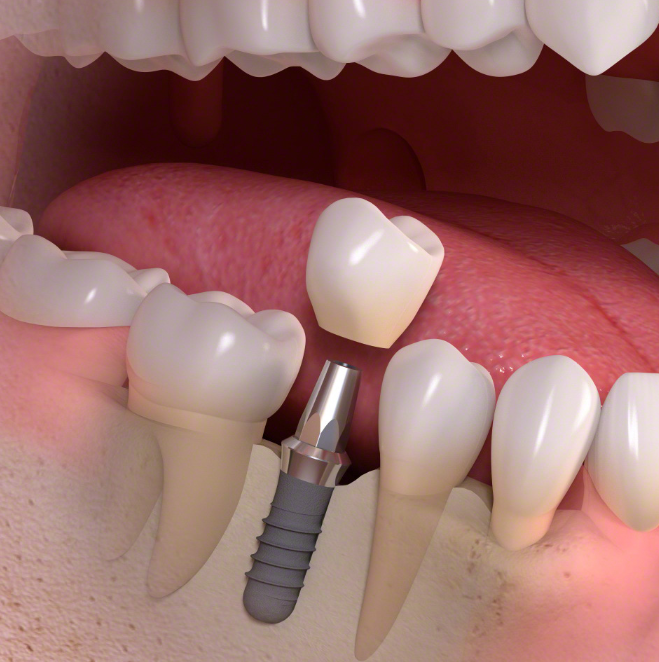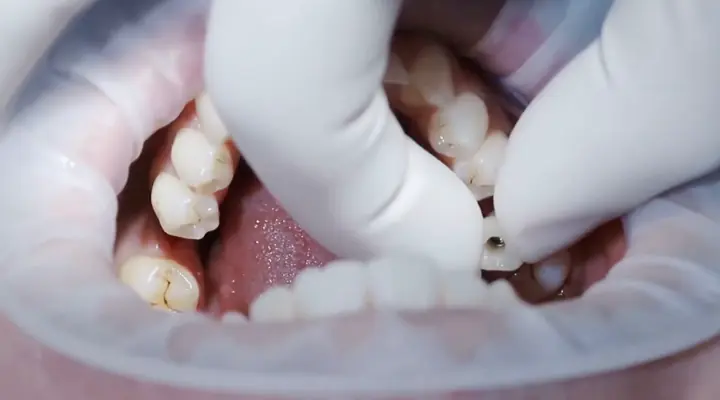Dental Implants in Rock Hill, SC
A long-lasting solution for missing teeth, personalized to your smile and supported by advanced technology and experienced implant dentists.
Your Trusted Rock Hill Implant Team
Missing teeth affect far more than your appearance. They change how you eat, how you speak, and how confident you feel around others. At River District Smiles, we take that personally. Our implant dentists have over 10 years of experience restoring smiles across Rock Hill and York County, and we’re committed to giving every patient the same level of care we’d want for our own families.
Our team uses advanced diagnostics like CBCT scans, digital impressions, CEREC technology, intraoral cameras, and digital X-rays to plan and place implants with accuracy and minimal discomfort. You’re not getting a generic, one-size-fits-all solution. You’re getting treatment backed by proven clinical skill, personalized planning, and leading-edge technology — all under one roof.
As members of the American Dental Association (ADA), South Carolina Dental Association (SCDA), and Academy of General Dentistry (AGD), our dentists follow the highest standards of safety, ethics, and continuing education in implant dentistry. You’re in trusted hands here.

What Dental Implants Are — In Simple, Practical Terms
A dental implant acts as an artificial tooth root. It’s made from biocompatible titanium and placed gently into your jawbone. Over time, the bone naturally bonds to it, creating a strong foundation for a crown, bridge, or full-arch restoration.
Instead of a removable appliance or a solution that depends on neighboring teeth, an implant becomes part of your mouth. It functions like a natural tooth and helps prevent bone loss, facial sagging, and shifting teeth.
If you’ve ever wondered whether an implant “feels real,” most of our patients say the same thing: after a few days, they forget which tooth was replaced. That’s the goal — a solution that feels seamless and natural.

Why Patients in Rock Hill Choose Dental Implants
Patients visit us for implants for different reasons: a missing front tooth from an injury, a back molar that was never replaced, or the desire for a more stable alternative to dentures. No matter the reason, dental implants offer several real-world benefits that improve daily life:
- Natural look and feel
Your crown is designed using digital impressions and CEREC technology, allowing us to match the shade and shape of your natural teeth.
- Better chewing ability
Unlike dentures, implants don’t shift or move. They restore strong bite force so you can enjoy foods comfortably again.
- Bone preservation
Implants stimulate your jawbone, preventing the bone loss that often happens after tooth extraction.
- Long-term durability
With proper care, implants can last decades — often a lifetime.
- Easy maintenance
You brush and floss them just like natural teeth. No adhesives. No special cleaning routines.
These aren’t vague benefits — they’re real improvements our Rock Hill patients share with us every week.

Are Dental Implants Right for You?
Dental implants can be an excellent choice if:
- You’re missing one or more teeth
- You want a more stable alternative to dentures or bridges
- Your jawbone is healthy enough to support an implant
- You’re committed to good oral hygiene
- You want a long-term solution rather than a temporary fix
This is something we evaluate during your consultation. We take a CBCT scan, review your medical history, and examine your bone structure to make sure implants are a safe and effective option for you.
Even if you’ve been told before that your bone is “too thin,” modern techniques like grafting may open the door to implants. We’ll discuss all your options clearly so you can make an informed, confident decision.

Why Choose River District Smiles for Implant Dentistry?
Choosing the right dentist matters. A dental implant is a long-term investment, and the experience of your provider directly affects how successful the treatment will be.
At River District Smiles, we offer several advantages that support long-lasting, predictable results:
Experience You Can Trust
With over a decade of clinical experience and advanced continuing education, our dentists have placed and restored implants for a wide variety of cases — from single-tooth replacement to full-arch rehabilitation.
Advanced Digital Technology
We use CBCT imaging to map bone structure, nerve pathways, and implant angles before treatment begins. Digital impressions and CEREC allow us to create precise, natural-looking restorations faster and more comfortably. Every step is carefully planned.
Comfort-Focused Care
Implant treatment doesn’t have to be intimidating. With gentle techniques, local anesthesia, and detailed post-op instructions, most patients say the process is far easier than they expected. We take the time to explain every step so you always know what to expect.
Transparent Recommendations
We don’t push unnecessary procedures or one-size-fits-all solutions. You receive honest guidance based on your anatomy, your goals, and your long-term oral health.
Local Care with Familiar Faces
We’re proud to serve the Rock Hill community. Many of our implant patients are neighbors, families, teachers, and local workers we’ve known for years. You’re cared for like part of our extended family — because to us, you are.
Types of Dental Implant Solutions We Offer
Every smile is different, so we offer several treatment options:
- Single-Tooth Implants
A one-to-one replacement when only one tooth is missing.
- Implant-Supported Bridges
Uses two or more implants to replace multiple missing teeth without affecting surrounding dentition.
- Full-Arch / All-On-X Implants
A stable, long-term alternative to dentures that replaces an entire arch with a fixed prosthesis.
- Implant-Supported Dentures
Removable dentures that click securely into place using implants for added stability.
During your consultation, we’ll help you understand which option best fits your goals, timeline, and budget.
Your Implant Procedure: What to Expect Step-by-Step
Most patients are surprised by how smooth the process feels. Here’s how it works:
- Consultation and 3D Digital Scan
We evaluate your oral health, bone density, and treatment goals. A CBCT scan gives us a precise, 3D view of your jaw.
- Personalized Treatment Plan
We outline costs, timelines, and recommended procedures. You’ll see a clear overview of what the next few months look like.
- Implant Placement
With guided surgical planning, the implant is placed accurately and comfortably. The visit is typically shorter and less invasive than expected.
- Healing and Osseointegration
Your jawbone bonds naturally with the implant over several weeks. Most patients return to work the next day with minimal discomfort.
- Abutment & Crown Placement
Once healed, we attach a custom crown made using digital impressions and CEREC for a seamless match to your surrounding teeth.
- Long-Term Care & Follow-Up
We review how to care for your new implant and schedule periodic checkups to ensure everything stays healthy.
This entire process is designed around comfort, predictability, and long-term success.
Real Patient Outcomes
Many River District Smiles patients tell us their dental implant changed more than their smile — it changed their confidence. Here are some patient testimonials:
Sherrxoxo
I recently had dental implant surgery with Dr. Matthew Hubis at River District Smiles — and it truly changed everything for me. After years of fear, trauma, and being told I was “too high-risk,” I finally found a team who saw me as a whole person — not a chart, not a number, but a soul.
Dr. Hubis and his team performed my surgery with such skill that I had zero pain afterward. That still blows my mind! He did so much work, yet I felt safe, respected, and genuinely cared for throughout the process. The pressure I feel now is healing — a reminder that something inside me is being rebuilt, not just physically, but emotionally too.
From the moment I walked in, Melissa told me we’d be like family — and she meant it. Every single person there radiates compassion, positivity, and support. I’ve never experienced anything like it.
I’m only two weeks in and extremely excited for the rest of this journey with everyone at River District Smiles
Jett Buskirk
Dr. Hubis is a great dentist. He’s extremely knowledgeable, professional and uses advanced technology. His rates are very competitive as well. He took great care of me from start to finish regarding my dental implant. I highly recommend him and his practice!
Schedule Your Dental Implant Consultation in Rock Hill, SC
A stronger, healthier smile begins with a conversation. Whether you’re replacing a single tooth or considering a full-arch solution, our team is here to guide you every step of the way.
Call River District Smiles or schedule your visit online today. We look forward to helping you smile with confidence again.



